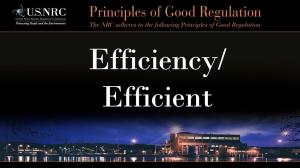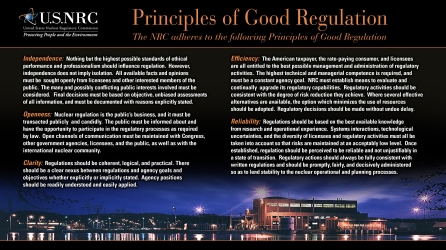Principles of Good Regulation: Efficiency
Posted by on February 10, 2017
Chief Financial Officer
The American taxpayer, the rate-paying consumer, and licensees are all entitled to the best possible management and administration of regulatory activities. The highest technical and managerial competence is required, and must be a constant agency goal. NRC must establish means to evaluate and continually upgrade its regulatory capabilities. Regulatory activities should be consistent with the degree of risk reduction they achieve. Where several effective alternatives are available, the option which minimizes the use of resources should be adopted. Regulatory decisions should be made without undue delay.
 The
principles of good regulation are critically important to the
day-to-day operations of the agency. They’re our guide posts. They’re
touchstones to help us be sure that we’re properly executing our
mission.
The
principles of good regulation are critically important to the
day-to-day operations of the agency. They’re our guide posts. They’re
touchstones to help us be sure that we’re properly executing our
mission.As the chief financial officer, I am partial to the efficiency principle. It is one of the reasons that I come to work every day. We are not only federal employees but also taxpayers and citizens, so we should be sure that we’re taking care of the nation’s resources appropriately. In addition to the payments we receive from our licensees, the NRC also receives an appropriation from the Congress each year. It’s “your money” and “our money” at the same time. Efficiency as we execute the agency’s work supports both the public good and the expectations we have as individuals for the best value we can offer.
As part of our focus on efficiency, the NRC has an initiative underway to improve our ability to plan and execute our mission. Known as Project Aim, this is an effort to find ways to better adapt to a dynamic environment and changes in workload. With direction from our Commissioners, the staff is working to “right-size” the agency to ensure we have the skills we need to accomplish our mission; to use agency resources more wisely; to improve the timeliness of our decision-making and respond quickly to changing conditions; and to promote unity of purpose through clearer agency priorities.
As Steering Committee co-chair, I have seen a lot of creativity from the staff as we work though the initial 19 tasks approved by the Commission, especially as we work to make processes more efficient and to shed unnecessary work. By the time we complete this effort, the NRC will have saved a total of nearly $50 million. That’s real money in my book.
 This
work requires us to find the right balance to make sure we are meeting
our safety mission while delivering results in a timely and
cost-effective way. As an example, we aim to review applications in a
timely manner while ensuring safety and security. Meeting this goal
depends in part on receiving complete, high-quality applications. Many
of our programs have implemented acceptance reviews, which give NRC
staff a chance to make sure an application is complete before we begin
our detailed technical reviews. If we find things we think are missing
or would otherwise slow down our technical review, we ask the applicant
to supplement their application. This process saves the licensee money
and allows our staff to work on other activities until that application
is ready.
This
work requires us to find the right balance to make sure we are meeting
our safety mission while delivering results in a timely and
cost-effective way. As an example, we aim to review applications in a
timely manner while ensuring safety and security. Meeting this goal
depends in part on receiving complete, high-quality applications. Many
of our programs have implemented acceptance reviews, which give NRC
staff a chance to make sure an application is complete before we begin
our detailed technical reviews. If we find things we think are missing
or would otherwise slow down our technical review, we ask the applicant
to supplement their application. This process saves the licensee money
and allows our staff to work on other activities until that application
is ready.For me one of the most important purposes of the principles is cultural. There are many different roles here at the agency. You hear people talk about being a technical or Commission office, as compared to people who provide corporate support. Or the distinction between people in the regions and those here in Rockville, Md. But, no matter your role, the principles apply to all of us. They are a unifying aspect to our culture. I can sit in a meeting with my colleagues in operating reactors or in nuclear materials and wastes and we’d still have an important shared vocabulary that is meaningful and helps us transcend our individual goals and move together toward the right solutions.
This post is the third of five that will explore each of the five principles separately. For the history of the Principles of Good Regulation, read this post.

No comments:
Post a Comment